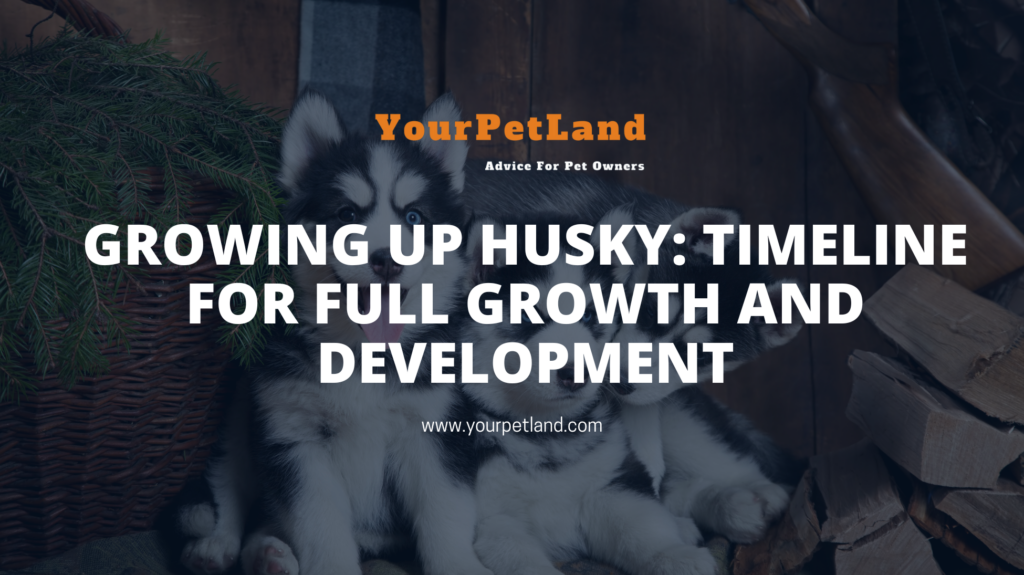Growing Up Husky: Timeline for Full Growth and Development
The Siberian Husky, known for its majestic appearance and vibrant energy, is a breed that captures hearts with its striking blue eyes and wolf-like features. Understanding the growth and developmental stages of a Husky is crucial for any owner who wants to ensure their furry companion thrives. This comprehensive guide provides a detailed timeline of a Husky’s growth and development, offering insights into physical, behavioral, and health aspects crucial for their well-being.
Puppy Stage (0-6 Months)
The early months in the life of a Siberian Husky puppy are a period of immense growth and development, shaping their journey into adulthood. This phase, encompassing the first six months, is characterized by significant changes in physical size, behavioral patterns, nutritional needs, health requirements, and exercise habits.
Physical Development:
- In their first six months, Husky puppies undergo rapid physical changes. Initially weighing a mere 5-10 pounds at birth, they can reach up to 30-40 pounds by the six-month mark. During this period, their playful and inquisitive nature is accompanied by significant growth in size and strength.
Behavioral Development
- This stage is critical for socialization and training. Husky puppies are naturally curious and energetic, making it the perfect time to introduce them to various people, animals, and environments. Basic obedience training should begin during this period to establish a foundation for good behavior.
Adolescent Stage (6-12 Months)
The adolescent stage, spanning from 6 to 12 months, is a transitional period for Husky puppies as they edge closer to adulthood. This phase is marked by continued physical growth, albeit at a slower pace compared to the puppy stage. Huskies typically reach their full height during this period, though they continue to gain muscle and coat density. Understanding and adapting to the changes in this stage is vital for the well-being of the Husky.
Physical Development
- As Huskies enter adolescence, their growth rate slows down. By one year, they are close to their full height, though they will continue to fill out in muscle and coat density. This stage marks the transition from puppyhood to adulthood in terms of physical appearance.
Behavioral Development
- Adolescent Huskies often display increased independence and may test boundaries. Consistent training and socialization remain vital as they develop their personality. This is also a prime time to reinforce training and establish a strong bond with your Husky.
Adult Stage (1-6 Years)
The adult stage of a Husky, spanning from 1 to 6 years, is when they reach full physical maturity. Huskies typically complete their growth in size and weight around their first birthday, but continue to develop in muscle tone and coat density. This period requires a focus on maintaining their health through regular exercise and a balanced diet to prevent obesity, a common issue in adult dogs.
Physical Development
- Huskies reach their full size and weight, typically between 35-60 pounds, by their first birthday. However, they continue to mature physically, with their full adult coat developing by the age of two. Regular exercise is crucial to maintain their muscular build and overall health.
Behavioral Development
- Adult Huskies are known for their intelligence and independence. They require mental stimulation in addition to physical exercise to prevent boredom and destructive behaviors. This stage is also ideal for advanced training and activities like sledding or agility courses.
Senior Stage (7 Years and Above)
As Huskies enter their senior years, typically at the age of seven and above, they start to experience the physical changes associated with aging. This may include a decrease in energy levels, slower metabolism, and potential development of age-related health issues such as joint stiffness or vision and hearing decline. Monitoring their physical condition becomes increasingly important to adapt their care accordingly.
Physical Development
- As Huskies enter their senior years, they may experience a decrease in energy levels and changes in their coat. Monitoring their health becomes increasingly important, with regular check-ups to catch any age-related issues early.
Behavioral Development
- Senior Huskies often show a calmer demeanor. While they may be less active, they still enjoy regular, gentle exercise. It’s important to adapt their training and activities to their aging bodies, focusing on comfort and quality of life.
Health and Nutrition Throughout the Stages
Proper nutrition is essential at every stage of a Husky’s life. Puppies require a diet rich in protein and fat to support their rapid growth, while adults need balanced nutrition to maintain their health and energy levels. Seniors may require diets tailored to their specific health needs.
Exercise and Training Needs
Huskies are high-energy dogs that require regular exercise throughout their life. Puppyhood is the time to introduce them to different forms of exercise, while adults need consistent, vigorous activity. Training should be ongoing, adapting to the Husky’s changing physical and mental capabilities.
Conclusion
Raising a Siberian Husky is a rewarding journey that requires understanding and adapting to their growth and developmental stages. By providing the right care, nutrition, and training at each stage, you can ensure your Husky lives a healthy, happy, and fulfilling life. Remember, each Husky is unique, and while this guide offers a general timeline, individual variations are to be expected and embraced.
Discover Your Husky’s Best Life with YourPetLand!
Ready to embark on an unforgettable journey with your Husky? Let YourPetLand be your trusted advisor every step of the way. From puppyhood to their senior years, we provide tailored advice, tips, and resources to ensure your Husky thrives at every stage of their life. Join us at YourPetLand and unlock the full potential of your furry companion’s happiness and health!

